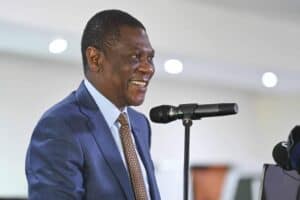A researcher says the land debate has become " a dialogue of the deaf", and says fundamentally there is nothing wrong with calls for the return of historically dispossessed land.

While South Africans have until the end of this month to comment on the draft national land policy for beneficiary selection and land allocation, an academic has found “nothing remotely radical” about the phrase “give back the land”.
Professor Brian Ganson, head of the Africa Centre for Dispute Settlement at the University of Stellenbosch Business School believes the principle of returning land to those who deserved it was “already contained in the constitution”.
Ganson said: ““The current constitution – never mind any amendments under consideration – promises restitution to people and communities dispossessed of property as a result of racially discriminatory laws or practices going back to 1913. It gives government a broad latitude to carry this out.”
He added: “If we want a satisfying positive progress – rather than just the thin gruel of self-righteous indignation that all sides of the land debate seem to be enjoying – a starting point might therefore be to acknowledge where others are right.
“The land reform debate largely remains
. Many spend their energy shouting about how they are right and others are wrong.”
Ganson said land reform in South Africa was “critically important in its own right: an unfinished promise to redress epic historic wrongs on the one hand and a project that could easily have unintended negative social and economic consequences.
“In particular, for the poor black South Africans, it should not be poorly managed. How we all go about land reform is also a bellwether of our ability to engage around the construction of the just, democratic and united South Africa envisioned by the constitution,” he said.
He proposed conflict resolution and problem-solving skills be applied, he said were “proven in other long-entrenched conflicts in South Africa, to shift heated public debate beyond opposing, one-sided arguments.
Research had shown that “a key skill of people who help find solutions to exceptionally entrenched conflicts, is perspective-taking – the capacity to view the world through the lens of other people’s fears, hopes, rights, and interests”.
He said: “In relation to those currently holding land that may be returned in the name of restitution under the provisions of the constitution, we can concede that many of the issues they raise – even if immaterial to the fundamental right of dispossessed people and communities to land – are real.”
Land, he said, “would indeed be better for all South Africans if land reform is managed in a way that confronts the realities of the substantial bonds on many properties, minimising corruption, maximising food security and improving the possibilities for people to make their livelihoods from the land or to make their transition to urban life – each according to his or her choice.”
Meanwhile, America’s Secretary of State Mike Pompeo on Wednesday said that South Africa’s plan to allow for expropriation of private property without compensation would be “disastrous” for the country’s economy and its people.
Pompeo made these comments in an address in Ethiopia on the final day of an Africa visit largely aimed at countering China’s influence on the continent.
This follow’s last year’s incident when President Donald Trump claimed that South Africa was seizing farms and that many farmers were being killed in the process. These claims were dismissed by the government at the time.
Statistics released by Afrikaner rights lobby group Afriforum earlier on Wednesday also indicated that though attacks on farms had increased, the number of murders had stabilised.
For more news your way, download The Citizen’s app for iOS and Android.






